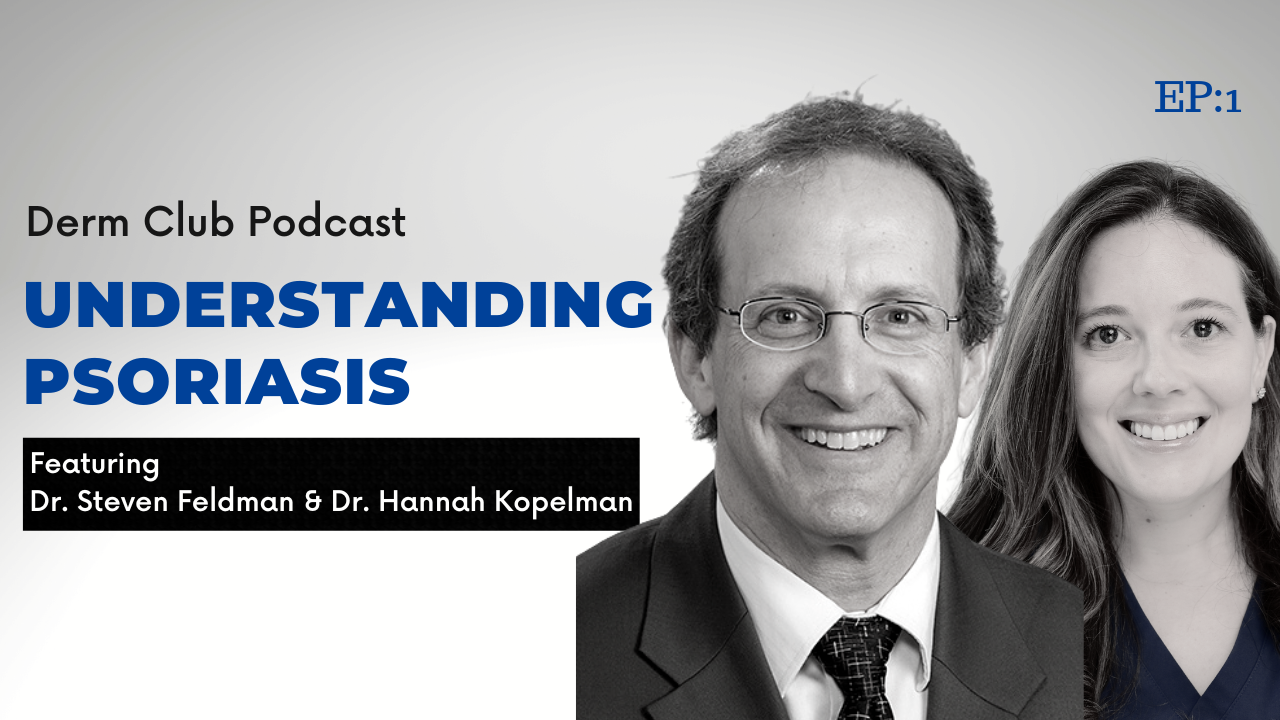I recently had the amazing opportunity to sit down with Dr. Steven Feldman, a renowned board-certified dermatologist from Wake Forest in North Carolina, for an insightful conversation about psoriasis on the Derm Club podcast. With over 800 publications on the topic, Dr. Feldman’s expertise in psoriasis is unparalleled.
During our discussion, we delved into various aspects of psoriasis, a chronic inflammatory skin disease that affects around 125 million people worldwide. We explored the different types and presentations of the disease, as well as the genetics behind it. As Dr. Feldman pointed out, psoriasis can have various presentations, with some people only experiencing mild dandruff-like symptoms, while others have their entire body covered in lesions. Other conditions, such as seborrheic dermatitis, can also cause dandruff, making it difficult to distinguish between the two.
Understanding the Route Causes for Psoriasis
Psoriasis can appear at any age but is most commonly diagnosed in adults, particularly in their late 20s. The genetics behind psoriasis is an active area of research, with many genes linked to the disease. Some of these genes are related to the immune system, such as the signaling molecule interleukin 23 (IL-23), which is also linked to psoriatic arthritis and inflammatory bowel disease. Psoriasis is not contagious in the traditional sense, though it could theoretically be transmitted through a bone marrow transplant. There are many diseases that psoriasis can be mistaken for, such as fungal infections, eczema, and syphilis. However, dermatologists are usually able to recognize psoriasis without the need for a biopsy.
One fascinating aspect of our conversation was Dr. Feldman’s thoughts on the complex relationship between psoriasis, obesity, and diet. Although no specific food has been found to worsen psoriasis, studies suggest that a restrictive diet, particularly one with calorie restriction, may improve the condition. However, the reasons for this improvement remain unclear.
We also discussed the importance of seeking help for psoriasis and how the condition affects people of all skin types and ethnicities. Dr. Feldman highlighted the psychological and social impacts of psoriasis and emphasized that treating the disease can significantly improve patients’ quality of life and boost their confidence.
Treatments: Topical Therapies, Injectable Biologics, and Ultraviolet Light
We explored the evolution of psoriasis treatment options from the dermatologist’s perspective. Dr. Feldman shared his insights on various treatments, from topical therapies to injectable biologics, and discussed the revolutionary drugs that have transformed the field. His insights emphasize the importance of choosing the right treatment based on each patient’s specific needs and preferences.
Topical therapies:
Dr. Feldman mentioned that for patients with localized psoriasis, topical treatments are often the first line of therapy. These include:
- Cortisone creams: These anti-inflammatory creams help reduce redness and inflammation, and come in various forms such as ointments, gels, lotions, and sprays.
- Vitamin D analogues: These synthetic forms of vitamin D help slow down skin cell growth and reduce scaling.
- Retinoids: Derived from vitamin A, retinoids help normalize skin cell growth and decrease inflammation.
Injectable biologics:
For more extensive or severe cases of psoriasis, Dr. Feldman discussed the use of injectable biologic medications. Biologics are genetically engineered proteins that target specific parts of the immune system involved in the development of psoriasis. Some of the major breakthroughs in biologic treatments include:
- Enbrel (etanercept): This was the first revolutionary biologic drug for psoriasis, which works by blocking the action of tumor necrosis factor-alpha (TNF-alpha), a protein involved in inflammation.
- Humira (adalimumab): Another TNF-alpha blocker, Humira has been widely used for the treatment of moderate to severe plaque psoriasis.
- Stelara (ustekinumab): Stelara targets interleukin-12 (IL-12) and interleukin-23 (IL-23), both of which play a crucial role in the development of psoriasis.
Dr. Feldman also shared his preference for newer biologic drugs like Tremfya (guselkumab) and Skyrizi (risankizumab), which specifically target IL-23. These medications have shown impressive long-term results and require fewer injections compared to older biologics.
Ultraviolet light treatments:
In addition to topical and injectable therapies, Dr. Feldman mentioned the use of ultraviolet (UV) light treatments for patients with more extensive psoriasis. UV light therapy, or phototherapy, can help slow down the growth of skin cells and reduce inflammation. Although tanning beds are not recommended due to their negative effects, they can sometimes provide accessible UV exposure for some patients to manage their psoriasis symptoms.
Finally, our conversation touched upon the challenges of treatment adherence in psoriasis management. Dr. Feldman shared valuable strategies for improving compliance, such as frequent follow-ups and better support and communication from medical professionals.
I am truly grateful to have had the opportunity to learn from Dr. Feldman’s vast knowledge and experience in the field of psoriasis. Our enlightening conversation shed light on the complexities of this chronic skin condition and the significant progress made in understanding and treating it. For more information on psoriasis and its treatments, visit the National Psoriasis Foundation’s website at psoriasis.org.





